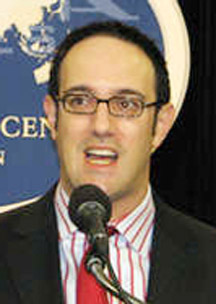It is “absolutely” important for opposition political parties to have equal access to state media, says Dr. David Lublin, a Professor in the Department of Government, School of Public Affairs, American Univer-sity, who is here to conduct a series of lectures.
Dr. Lublin is the guest speaker for the US Embassy’s series on “Democracy and the Role of Free, Fair, and Transparent Elections in the Nation Building Process.” Meeting with reporters yesterday, Lublin, in response to a question, said that it is important for opposition political parties to have access to state media.
Citing presidential elections in the US, he pointed out that both major candidates are covered all the time. In major stories as well, there is media coverage of the parties’ positions, added Lublin. “I think it’s important not to only have access for both parties but to have access to lots of opinion,” he said, while adding that this is what “makes for good, open democratic politics.” He said that an independent media is a means of holding officials to account and also plays a part in limiting corruption and making sure government is responsive to the people. “It’s not always very nice but it helps make sure politicians act better,” he said.

Meantime, according to the professor, the key thing in media is to “allow a huge range of pluralism.” Journalists also have the responsibility to seek out and print the views of both sides. “It’s also important that everyone have access to the media,” Lublin said. He also underscored the importance of an independent media. In the US, there is no state owned media while in others countries there is, but it is usually independent, he said, citing the BBC in the UK. “It’s good …even if media is owned by the government, to be independent and that part of the job of even government-owned media is to hold the government accountable,” he emphasised.
He noted that in politics, transparency is important and access to media and allowing a pluralism of media to occur is important. Govern-ments need to embrace this, he said, describing it is a “key part to enrich their country.”
“You have to have reasonable access and openness,” Lublin added. What is important as well is that journalists need to have independence, he stressed.
Meantime, he said that over the long term, Guyana has made a lot of progress in terms of moving from a dictatorship to where it has held several democratic elections. Demo-cracy is not a finished project. It is something that you keep working on, Lublin said. He stated that what is unique about Guyana is the “very closed nature” of the party list system. He said that this gives very little opportunity for input from ordinary voters into the construction of that list. “Many countries with closed list have often a party convention or primary where more ordinary citizens involved with the party can help choose the order of the list and there’s a lot of competition for the good places high up on the list…” he noted.
Meantime, the professor said that the “ethnisation” of politics is not unique to Guyana and there are many different ways of dealing with it. He said that from speaking with youths, they would like to breach this divide. It takes people getting involved in politics to do that, said Lublin. “Ironically here in Guyana the size of the groups may not be so stable that my hope is that would encourage more reaching across the ethnic divide,” he said, while adding that the efforts of both parties to reach out to the Amerindian community is interesting and “a good sign.” Peaceful elections and respect for the majority and the minority is paramount, he said.
Since receiving his Ph.D. from Harvard, Dr Lublin has authored two books, The Paradox of Representa-tion: Racial Gerrymandering and Minority Interests in Congress and The Republican South: Democra-tization and Partisan Change. He has published articles in a variety of journals, including the American Political Science Review, American Journal of Political Science, Journal of Politics, Stanford Law Review and the Washington Post. His work on redistricting was cited by the Supreme Court in Georgia v. Ashcroft.





